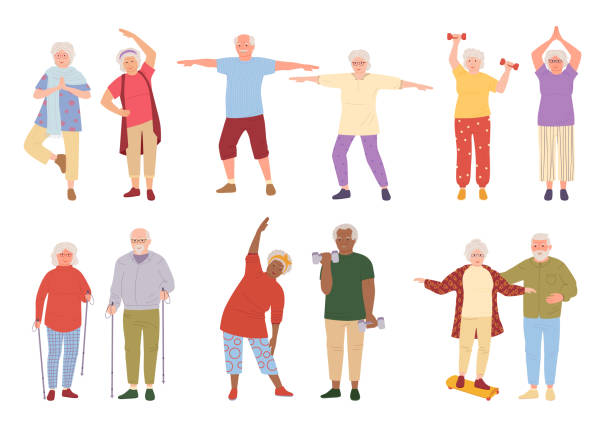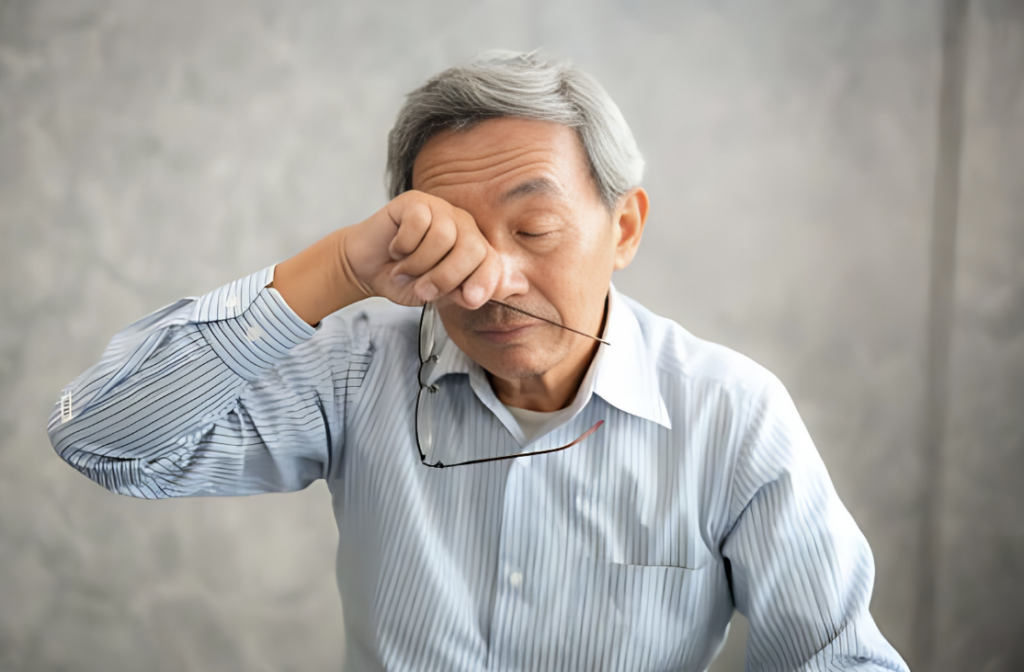Wellness
What Truly Causes Fatigue in Seniors
Our bodies change dramatically as we age, and one of the most common complaints among seniors is fatigue. This pervasive sense of exhaustion can have a substantial influence on daily living, reducing both physical vigor and mental clarity. Understanding the multidimensional nature of weariness in seniors necessitates a careful examination of the numerous contributing elements. Fatigue in older individuals can be caused by a variety of factors, including underlying medical issues and lifestyle decisions. In this article, we will look at the complex interaction of physiological, psychological, and environmental elements that can cause weariness in seniors, as well as provide insights and solutions for dealing with this common problem and enhancing the overall quality of life in later years.

Common Causes of Fatigue in Seniors
Fatigue is a frequent complaint among the elderly. In many circumstances, it is an expected component of the aging process. However, it may also indicate an underlying medical issue or lifestyle factors. In this part, we’ll look at some of the most prevalent reasons for fatigue in seniors.
Medical Conditions and Diseases
There are a variety of medical illnesses and disorders that might induce weariness in seniors. The most prevalent ones include anemia, heart disease, cancer, renal disease, lung illness, thyroid disease, and diabetes. Chronic disorders, such as rheumatoid arthritis and multiple sclerosis, can also result in weariness. These disorders can impair the body’s ability to produce energy, resulting in weariness.
Lifestyle Factors and Nutrition
Lifestyle and nutrition can also contribute to weariness in seniors. Dehydration, poor nutrition, and weight loss can all cause weariness. Seniors who do not get enough protein or other nutrients may also feel fatigued. In addition, a lack of exercise and physical activity might lead to weariness.
Medication Side Effects
Many drugs may cause fatigue as a side effect. Seniors who take various medications may be more likely to experience weariness as a result of drug interactions. Antidepressants, antihistamines, and blood pressure drugs are some of the most frequent medications that might produce fatigue.
Finally, fatigue in seniors might be caused by a variety of circumstances. To adequately treat fatigue, it is necessary to first identify the underlying reason. Seniors who are suffering from persistent fatigue should consult with their doctor to establish the cause and devise a suitable treatment strategy.

Physical and Mental Health Contributors
Fatigue is a common complaint among the elderly, and it can be caused by a number of physical and mental health issues. In this part, we’ll look at some of the most common causes of fatigue among seniors.
Psychological Factors
Depression, worry, and stress are all potential causes of weariness in seniors. Depression is a prevalent mental health disorder among seniors, characterized by feelings of melancholy, hopelessness, and loss of interest in activities. These feelings might cause exhaustion and a loss of vitality. Anxiety and worry can also create fatigue by activating the body’s stress response, resulting in physical and mental exhaustion.
Physical Activity and Exercise
Physical activity and exercise are crucial for seniors to maintain excellent health and avoid weariness. Lack of exercise and physical activity can cause weakness, decreased mobility, and weariness. Seniors who participate in regular physical activity, such as walking, tai chi, or yoga, are more likely to have more energy and better overall health. Exercise can also enhance mood and reduce stress and anxiety, both of which can lead to exhaustion.
To summarize, fatigue among seniors can be caused by a range of physical and mental health issues. Seniors who experience fatigue should consult with their doctor to establish the underlying cause and devise a treatment strategy. Incorporating regular physical activity and exercise into their daily routine can also assist in boosting energy and general health.

Assessment and Management of Fatigue
Diagnosis and Evaluation
Fatigue is a typical complaint among seniors, but it might also indicate an underlying medical issue. As a result, an accurate diagnosis and evaluation are critical. The healthcare professional will review the patient’s medical history, symptoms, and current medications. They may also perform physical examinations and testing to rule out any underlying medical issues that could be causing the fatigue.
Healthcare providers can diagnose exhaustion using a variety of techniques, including the FACIT exhaustion Scale, a questionnaire that analyzes the intensity of weariness. The scale is often used to assess the influence of exhaustion on a patient’s daily activities and general well-being.
Treatment and Fatigue Management
The underlying cause of weariness in seniors determines the treatment and management options. For example, if the exhaustion is caused by anemia, the doctor may prescribe iron supplements. If the exhaustion stems from depression, the doctor may prescribe antidepressants or refer the patient to a mental health expert for cognitive-behavioral treatment.
In addition to medical treatment, seniors can employ a variety of self-care measures to manage fatigue. This includes:
- Getting adequate sleep: Seniors should get 7-8 hours of sleep per night.
- Regular exercise might help you gain energy and lessen weariness.
- Eating a nutritious diet rich in fruits, vegetables, and whole grains will help boost energy levels.
- Stress can cause weariness, therefore elders should adopt healthy stress management techniques like meditation, deep breathing, or yoga.
Palliative care and integrative medicine can also be utilized to treat weariness in elders. Palliative care aims to improve the quality of life for patients with serious illnesses, whereas integrative medicine integrates conventional treatment with complementary therapies like acupuncture and massage therapy.
To summarize, fatigue is a typical complaint among seniors, but it is manageable with correct diagnosis and treatment. Seniors should collaborate closely with their healthcare professionals to determine the root cause of their exhaustion and create a specific treatment plan that combines medical treatment, self-care measures, and other therapies as needed.

Support and Coping Strategies for Seniors
Fatigue may be an unpleasant and debilitating ailment for the elderly. Fortunately, there are a variety of support and coping strategies available to assist seniors to manage their fatigue and enhance their quality of life.
Support from Family and Friends
Seniors who have a solid network of family and friends are often better able to deal with weariness. Loved ones can offer emotional support, assist with everyday tasks, and urge seniors to live healthy lifestyles.
Coping
Coping skills can also assist elders deal with weariness. Seniors can use relaxation techniques such as deep breathing or meditation to alleviate tension and improve calm. They might also practice pacing themselves during the day to save energy and avoid tiredness.
Daily Activities
Seniors might also modify their everyday activities to reduce weariness. For example, they can take periodic breaks during the day, prioritize critical work, and delegate responsibilities whenever possible.
Emotional Stress
Emotional stress can also lead to weariness. Seniors can benefit from speaking with a mental health expert to learn coping skills for stress and anxiety.
Chronic Pain
Chronic pain can also lead to weariness. Seniors can collaborate with their healthcare physician to create a pain management strategy tailored to their unique requirements.
Lifestyle Habits
Lifestyle behaviors might also affect fatigue levels. Seniors can strive to eat a good diet, stay hydrated, and avoid smoking and excessive drinking.
Low-Impact Exercises
Walking, swimming, and yoga are all low-impact exercises that can help seniors manage fatigue. Exercise can increase energy, encourage relaxation, and reduce stress.
Overall, seniors can benefit from a multifaceted approach to tiredness management that includes social support, coping mechanisms, changes to daily activities, and healthy lifestyle practices.
Conclusion
Finally, uncovering the riddles of fatigue in seniors reveals a complicated tapestry constructed from a variety of components. Fatigue in older individuals can be caused by a wide range of factors, including chronic illnesses, sleep difficulties, pharmaceutical side effects, and emotional well-being. By identifying and treating these underlying causes, seniors and their caregivers can better manage the problems of weariness and work toward solutions that promote vitality and resilience in later life. There are options for seniors to reduce the burden of weariness and improve their general well-being, such as lifestyle changes, medication therapies, or psychosocial assistance. As we get a better knowledge of the complex processes at play, we may take a more informed and compassionate approach to supporting older individuals’ health and vitality.
Trusted Health, Wellness, and Medical advice for your well-being


